Blacking out, or alcohol-induced amnesia, affects a significant number of individuals who engage in heavy drinking. Research indicates that about one-quarter of college students report blacking out at some point due to excessive alcohol consumption, according to a study from the National Institute on Alcohol Abuse and Alcoholism (NIAAA). This proves not just the prevalence of the issue among young adults but also underscores the widespread nature of risky drinking behaviors.
The dangers of blacking out extend beyond temporary memory loss. During a blackout, an individual can function and make decisions without retaining any memory of their actions, which can lead to risky behaviors such as driving under the influence, unprotected or unwanted sexual activity, and other hazardous actions that could have legal or health consequences. Frequent blackouts can increase the risk of serious injuries, assaults, and chronic memory problems, emphasizing the need for awareness and prevention.
The primary cause of blacking out is rapid alcohol consumption that leads to a high blood alcohol concentration (BAC). When BAC rises quickly, it impairs the brain’s ability to transfer short-term memories to long-term storage, resulting in gaps in memory recall. Factors that contribute to a higher risk of blacking out include drinking on an empty stomach, which speeds up alcohol absorption, and engaging in binge drinking. Understanding these causes can help individuals make safer choices regarding alcohol consumption.
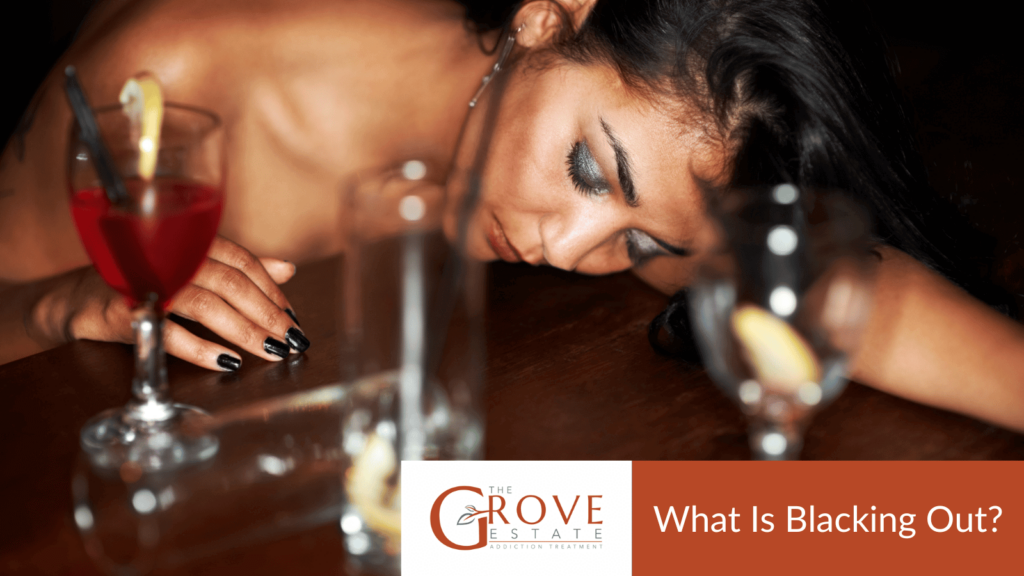
What Is Blacking Out?
A blackout, in the context of alcohol consumption, refers to a temporary condition of amnesia during which a person actively engages in events but later cannot remember them. This condition is triggered by a rapid increase in blood alcohol concentration (BAC) that affects the brain’s ability to transfer new experiences from short-term to long-term memory.
There are two types of blackouts associated with drinking: fragmentary and en bloc. Fragmentary blackouts, often called “brownouts,” involve partial memory loss. Individuals may remember some details of events with cues or reminders. On the other hand, en bloc blackouts involve complete memory loss for a period of time. During an en bloc blackout, the individual is unable to recall any details of events, regardless of efforts or cues. Both types indicate significant alcohol intoxication, but they differ in the extent and nature of the memory impairment experienced.
How Does Alcohol Cause Blackouts?
Alcohol causes blackouts through its significant physiological effects on the brain, particularly impacting the areas involved in memory formation. When alcohol is consumed, it disrupts the neurotransmitter systems, including gamma-aminobutyric acid (GABA) and glutamate. GABA’s role is to inhibit brain activity, and alcohol increases this inhibition, which can drastically affect memory encoding. Meanwhile, glutamate, which is essential for forming memories, sees its activity reduced under the influence of alcohol.
As Blood Alcohol Concentration spikes, the ability to form new long-term memories becomes impaired, that said, it does not affect one’s ability to keep participating in events at the moment. This disconnect is why people can continue to function, sometimes appearing only mildly intoxicated without any recollection afterward. Understanding how BAC levels influence memory formation helps explain why blackouts are not merely signs of general intoxication but specific markers of excessive alcohol consumption impacting the brain.
What are the Symptoms of a Blackout?
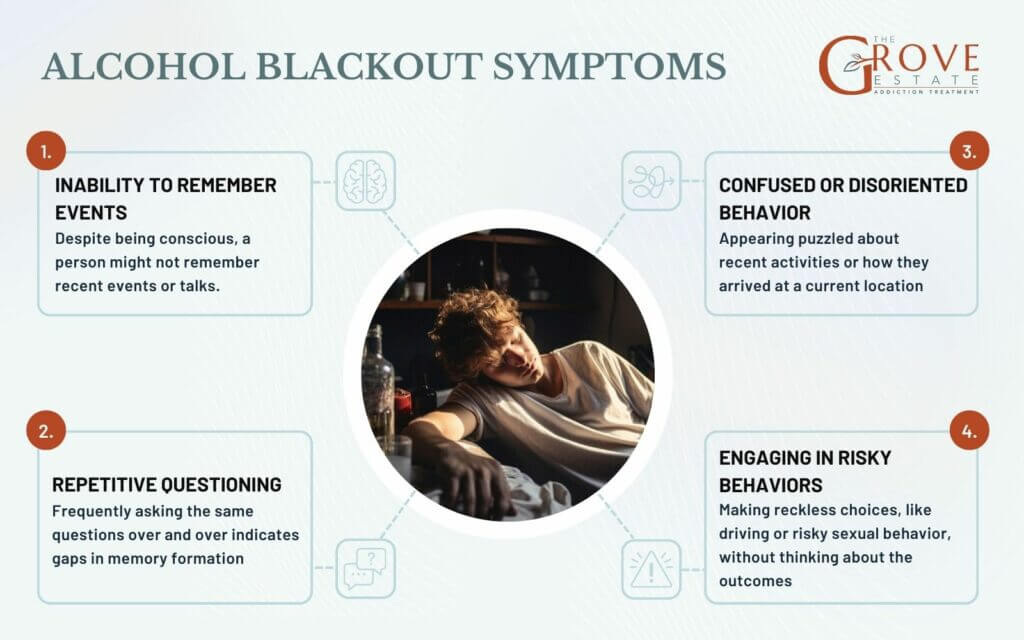
The symptoms of a blackout, although often invisible at the moment, are crucial to recognize for ensuring safety. Signs that someone is experiencing a blackout include:
- Inability to remember events: Despite being conscious and active, the person may not recall recent events or conversations.
- Repetitive questioning: Frequently asking the same questions over and over indicates gaps in memory formation.
- Confused or disoriented behavior: Appearing puzzled about recent activities or how they arrived at a current location.
- Engaging in risky behaviors: Making unusual decisions without considering consequences, such as driving or engaging in unsafe sexual activities.
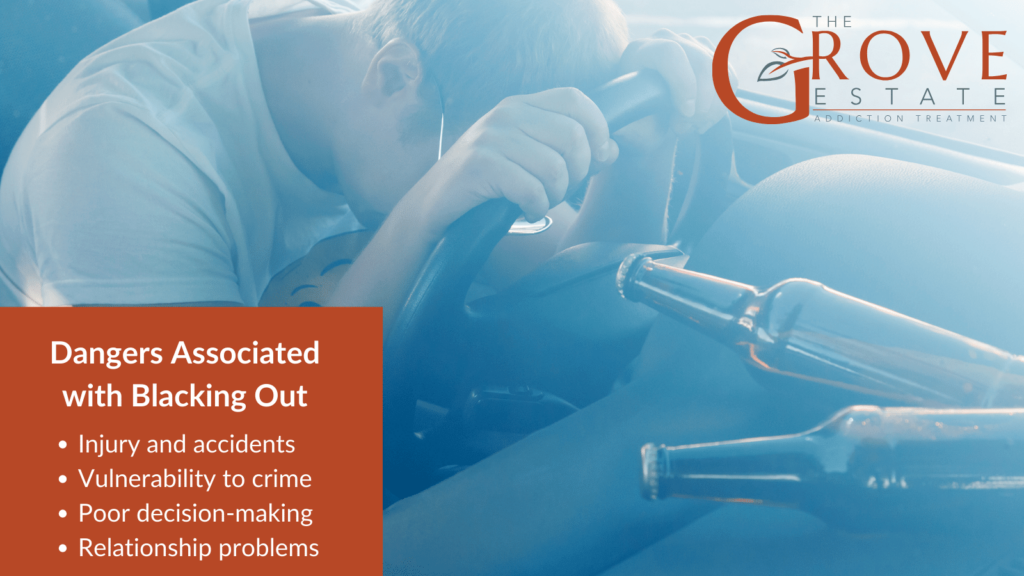
What are the Dangers Associated with Blacking Out?
Blacking out from excessive alcohol consumption carries significant risks and potential consequences that can affect one’s health and safety. Key dangers associated with blacking out include:
- Injury and accidents: During a blackout, the lack of memory does not impede physical capabilities, leading individuals to engage in activities such as driving, walking in unsafe areas, or handling dangerous objects, all without any recollection later.
- Vulnerability to crime: Being in a vulnerable state increases the risk of becoming a victim of theft, assault, or sexual violence. The impaired judgment and memory loss make it difficult for individuals to protect themselves or seek help.
- Poor decision-making: Blackouts often involve decisions that individuals would not make under normal circumstances, such as risky sexual behavior or drug use, which can have long-term health or legal consequences.
- Social and relationship problems: The actions taken during a blackout can strain relationships, leading to conflicts with friends, family, and colleagues due to unremembered behaviors or remarks.
There is a strong connection between blackouts and alcohol poisoning. Blackouts often occur under conditions of rapid drinking to high intoxication levels, similar to those that lead to alcohol poisoning. Both conditions indicate dangerous levels of alcohol consumption, but while alcohol poisoning impacts the body’s physical functions immediately and visibly, blackouts affect cognitive functions, leaving individuals disoriented and without memories of their actions. Recognizing the seriousness of blackouts is crucial as they are a clear signal that drinking habits may be putting the individual at risk of severe harm or death.
Who Is Most At-Risk for Blacking Out?
Individuals who are most at risk for blacking out often fall into certain demographic and behavioral categories:
- Young Adults and College Students: This group is particularly susceptible due to prevalent binge drinking behaviors often observed at parties, bars, and on college campuses. Social pressures and the experimental nature of this life stage contribute to higher alcohol consumption rates.
- Women: Biologically, women often have a lower body mass and different body composition compared to men, which can lead to higher blood alcohol concentrations after consuming the same amount of alcohol. This biological difference makes women more likely to experience blackouts at lower levels of alcohol consumption.
- Individuals with a Family History of Alcohol Abuse: Genetic factors can influence how alcohol is metabolized. People who have family members with a history of alcohol abuse or blackouts are more likely to experience them themselves.
- Experienced Drinkers with High Tolerance: Those who frequently consume alcohol may develop a tolerance, which can lead them to consume larger quantities of alcohol to achieve the desired effects. This increased consumption heightens the risk of blacking out.
Understanding that these groups are more at risk can help target preventive measures and educational efforts to reduce the incidence of alcohol-related blackouts and their associated dangers.
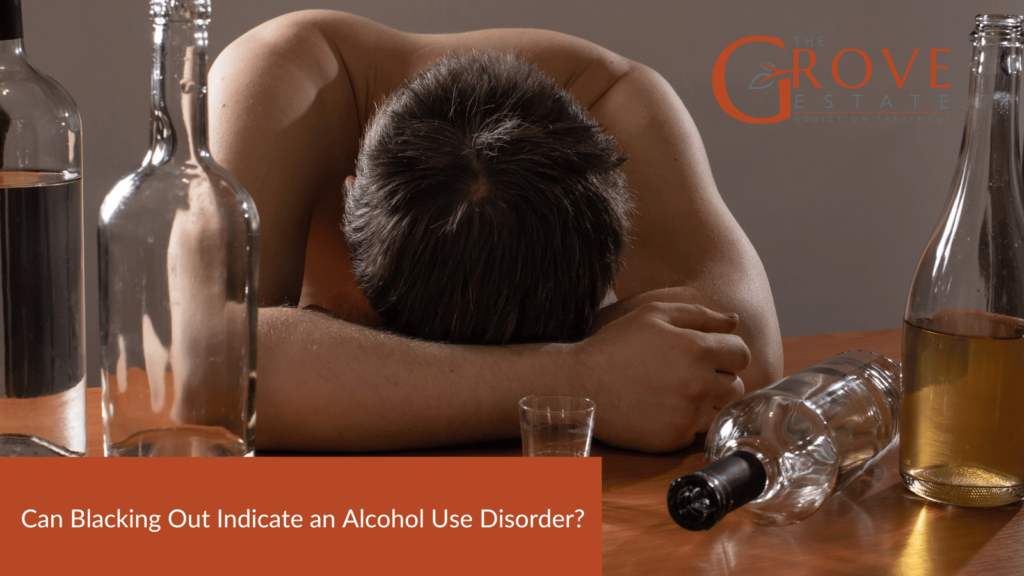
Can Blacking Out Indicate an Alcohol Use Disorder?
Repeated episodes of blacking out can indeed be a red flag for an underlying alcohol use disorder. Blackouts are often a sign of excessive alcohol consumption, and experiencing them frequently suggests a pattern of risky drinking behavior. Such patterns may escalate without intervention, potentially leading to dependency or addiction. If blackouts are occurring regularly, it’s crucial to consider this a serious concern. Seeking help can start with talking to a healthcare provider about drinking habits or contacting support groups like Alcoholics Anonymous. Early intervention can help address and manage alcohol use disorders effectively, preventing further health complications and improving quality of life.
How to Respond to a Blackout: Immediate Steps and Support
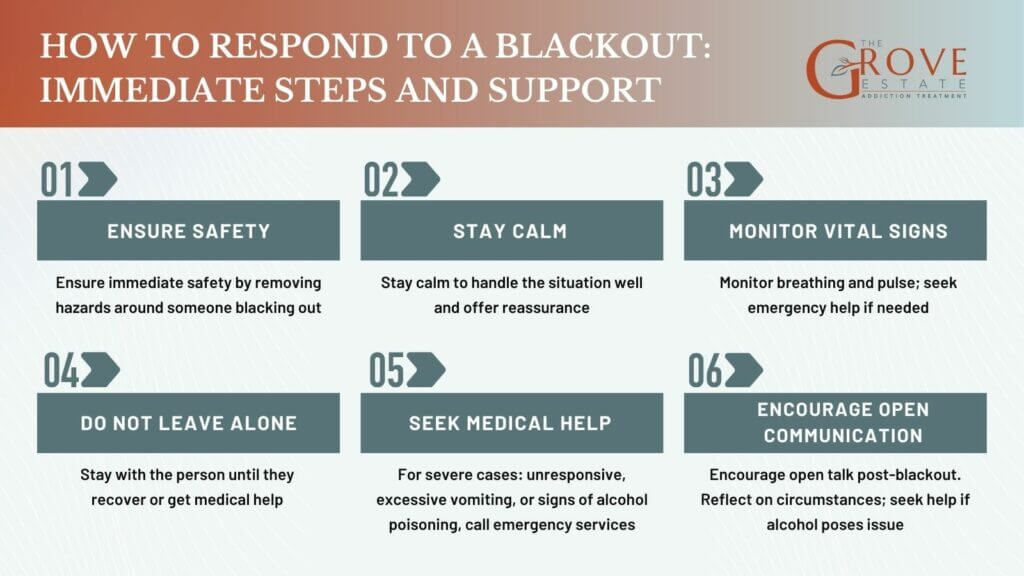
When faced with a blackout, whether it’s you or someone you know, it’s essential to take immediate steps and provide support:
- Ensure Safety: If you notice someone blacking out, ensure their immediate safety by removing any potential hazards or dangers in their vicinity.
- Stay Calm: Keep a calm demeanor to help manage the situation effectively and provide reassurance.
- Monitor Vital Signs: Check the person’s breathing and pulse to ensure they are stable. If there are any signs of distress or difficulty breathing, seek emergency medical help immediately.
- Do Not Leave Alone: Stay with the person experiencing the blackout or ensure they are in the care of a responsible individual until they recover or receive medical attention.
- Seek Medical Help: In severe cases where the person is unresponsive, vomiting excessively, or showing signs of alcohol poisoning, do not hesitate to call emergency services for professional medical intervention.
- Encourage Open Communication: After the blackout episode, encourage open communication about what happened. If it was you who experienced the blackout, reflect on the circumstances leading up to it and consider seeking help or guidance if alcohol consumption is becoming problematic.
How to Seek Help and Resources for Alcohol Misuse and Blackouts
Seeking help for alcohol misuse and frequent blackouts is important for managing these issues effectively. Here’s how to access support and resources:
- Contact Healthcare Professionals: Start by reaching out to healthcare providers or addiction specialists who can assess the severity of the situation and recommend appropriate treatment options.
- Explore Support Groups: Consider joining support groups like Alcoholics Anonymous (AA) or SMART Recovery, where individuals with similar experiences share insights, strategies, and encouragement for overcoming alcohol-related challenges.
- Therapy and Counseling: Individual therapy, like cognitive behavioral therapy, or group counseling sessions with trained therapists specializing in substance abuse provides valuable guidance, coping strategies, and emotional support.
- Educational Programs: Participate in educational programs or workshops focused on alcohol awareness, harm reduction, and developing healthier drinking habits.
- Medication-Assisted Treatment (MAT): For individuals with alcohol use disorders, MAT programs may offer medications combined with therapy to help manage cravings and reduce alcohol consumption.
- Encourage Loved Ones: If you suspect a friend or family member is struggling with alcohol misuse and frequent blackouts, encourage them to seek help and offer your support throughout their recovery journey.
Remember, seeking help is a sign of strength, and taking proactive steps toward recovery can lead to improved health, well-being, and quality of life. If you or someone you know is struggling with alcohol-related issues, don’t hesitate to reach out for support and resources.
Why does the brain decide to “erase” some episodes after excessive drinking?
Blackouts occur because alcohol significantly impairs the brain’s ability to form new memories. When blood alcohol levels become very high, the function of the hippocampus is disrupted. This disruption prevents the transfer of information from short-term to long-term memory, effectively blocking memory encoding. Therefore, the brain isn’t intentionally “erasing” memories; rather, it’s failing to store them in the first place due to alcohol’s interference.
Is there a specific threshold of alcohol consumption that triggers a blackout, or does it vary by individual?
There is no universal threshold for alcohol consumption that triggers a blackout as it varies significantly among individuals. Factors that influence this variability include the individual’s rate of alcohol metabolism, overall body composition, tolerance to alcohol, and even genetic factors. Generally, blackouts are more likely when alcohol is consumed rapidly and in large quantities, allowing blood alcohol concentrations to rise quickly.
Can frequent blackouts from alcohol signal an underlying threat to one’s neurological landscape?
Yes, frequent blackouts signal a potential threat to neurological health. Repeated high levels of intoxication that lead to blackouts will cause damage to the brain over time. This manifests as impairments in memory, cognitive functions, and decision-making abilities. Chronic misuse of alcohol, leading to frequent blackouts, is also associated with an increased risk of developing more serious neurological conditions and other health problems like alcohol use disorder (AUD).
What are the signs that a blackout is imminent during a drinking session?
While a blackout itself might seem sudden, there are usually signs that one is approaching. These include noticeable changes in behavior such as confusion, difficulty conversing, repetitive questioning, or a general inability to perform usual tasks. Physical signs might include loss of coordination, stumbling, glassy or unfocused eyes, and slurred speech.
How do blackouts differ from passing out?
While both blackouts and passing out involve alcohol, they are distinctly different phenomena. A blackout involves memory loss due to alcohol impairing the brain’s ability to transfer information from short-term to long-term storage, meaning the person can still interact with their environment but will not remember their actions later. On the other hand, passing out refers to losing consciousness altogether due to excessive alcohol intake, which is a direct result of the central nervous system being severely depressed.
Understanding these differences is crucial for recognizing the risks associated with excessive drinking and taking appropriate measures. Information on the broader effects of alcohol on the body can help individuals recognize warning signs and avoid the dangerous levels of consumption that lead to passing out or experiencing a blackout.
Can blackouts cause permanent damage to the brain?
Frequent blackouts can indeed lead to permanent brain damage, particularly affecting areas involved in memory and cognitive functions. This damage occurs because high levels of alcohol disrupt the brain’s chemical processes and neural pathways, which over time can result in cognitive deficits and diminished brain capacity. Chronic alcohol abuse, marked by repeated blackouts, is often associated with conditions such as Wernicke-Korsakoff syndrome, a serious and debilitating brain disorder.
For those concerned about the long-term impacts of alcohol on cognitive health, engaging in holistic therapy might offer beneficial strategies to recover brain health and overall well-being. This type of therapy looks at all aspects of an individual’s life, offering a comprehensive approach to recovery that includes mental, physical, and emotional health.

Share This Post



